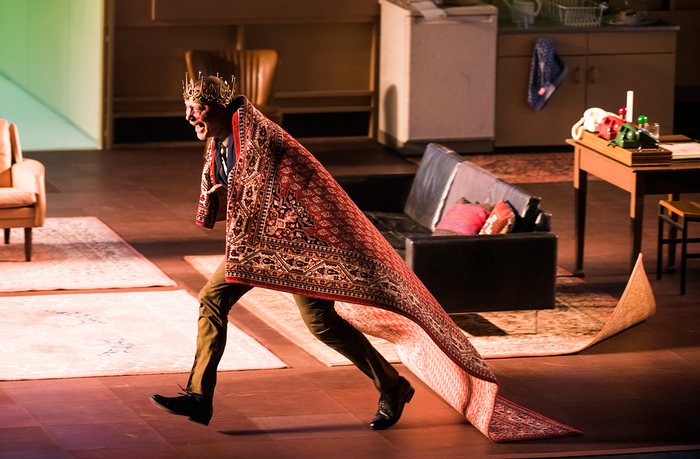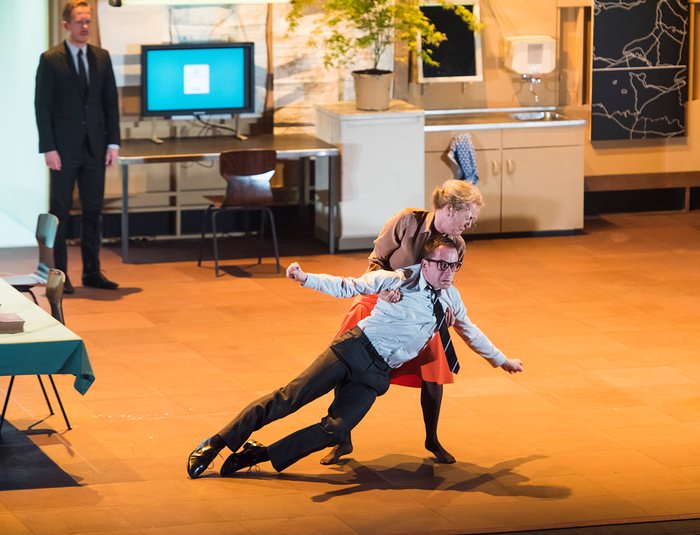What does leadership look like? We’re seeing an American election which has thrown up new models of presidential presentation: female politicrat, throwback socialist, celebrity blowhard.
In Toneelgroep Amsterdam’s Kings of War, we see three more, applicable to our own time. Henry V, playboy-turned warmonger; the bedwetter, Henry VI; Richard III, the psycho who no one takes seriously until far too late. ‘Shakespeare is unequalled in his portrayal of leadership and power,’ says director Ivo van Hove. ‘It is inspiring to discover Shakespeare as a contemporary who is dealing with the type of events we see on the news every day: the dark machinations of the people in power and the violence that their decisions bring about.’
His production distils five history plays down to 270 minutes and reboots the tropes of power. Elaborate ceremony bows to viral soundbite, while warmongers can now wreak havoc from their desk. Regime change is here marked by a perfunctory coronation – the new monarch plus any confederates still living march down the corridor and across a red carpet (stored on a roller for convenience). Crown and ermine capelet are plonked on, then tucked back onto the perspex shelving, ready for next time (next time is usually less than an hour away). Jan Versweyveld’s set, a windowless bunker, is modelled on Churchill’s war rooms but equipped like a modern office – monitors, clipboards, trombone quartet. This last adds fanfare or ominous drone to events, while a countertenor (Steve Dugardin) in civil servant suiting hoots his laments unregarded.
CGI rhetoric
Like Toneelgroep’s Roman Tragedies (2007), this production has immense cumulative power. A sterile white corridor frames the set, and a camera captures the offtstage conspiracies and assassinations. By setting it in a blanched site of contemporary leadership, he images government in war as a numbers game with hideous consequences, far enough removed for comfort.
‘Wap bap bap,’ shouts Ramsey Nasr’s bearded Henry V. We’re a long way from Olivier’s puddingbowl warrior, commanding from the front. Nasr leads from a safe distance, inspiring or intimidating through broadcast and sound effect. He recites ‘once more unto the breach’ from notes (to judge from the surtitles, the adaptation combines direct translation and pointed paraphrase), then goes off-script and jabs a menacing finger into the camera. Nasr insistently highlights threatened atrocities, extreme images of civilian grief – he bludgeons foes into submission via a kind of CGI rhetoric. When challenged, he blusters. Kings don’t do argument.
Everyone is miked, muted to an unrhetorical murmur – the play is shorn of manspreading bravado, but can feel arid. The fractious coalition around Henry VI tends to something more shouty. Muttering conclaves are streamed from the corridor – as are an adulterous post-coital conflab, several assassinations and, most startlingly, Henry shoving through a flock of sheep, envying pastoral freedom from responsibility, a lamb in a world of wolves.
Henry VI is often played as a dissenter from his bloodbolted world. Here, Eelco Smits gawps through big glasses, a bewildered man-child among snarling adults. Even as people scheme around him, he solemnly climbs into his pyjamas, makes his bed like a good boy. He tries to do politics, but crumples in tears during conflict – grasping onto his uncle’s tweed jacket even as he has him arrested. The mess of it is magnetic.
With so much shaved away from the texts, you pay attention to what remains. Van Hove mostly deletes the rebels or anonymous footsoldiers who intrude upon the mighty. A leader’s decisions may affect thousands, but modern government isolates you from sharing oxygen with them. Instead, he examines power grabs among the inner circle: Grey’s ineffectual attempt to double-cross Henry V; the Duchess of Gloucester’s futile coup, which only shoves her family from power; Richard’s confidant Buckingham reaching the limits of his access. All suggest the isolation and paranoia of the powerful – only a step away from a shafting, never able to relax into friendship.
For many directors of these plays, the grim cycle of history is the determining factor. Recurring images unify the action – Peter Hall’s council table, Adrian Noble’s throne, Michael Boyd’s sorrowing fathers and sons. Van Hove offers alternative models, but gives the production a cyclical curve as Nasr, who began as Henry V, returns as Richmond, Richard III’s nemesis and the future Henry VII. Yet Van Hove pursues an idea of the isolation of leadership, even in a tirelessly connected world – isolated from both the consequences of action, from colleagues and citizens, and ultimately from any sense of conscience.
When the York dynasty takes charge, the bunker is briefly restyled as a lobby with leather sofas and a resident DJ. The new queen (Chris Nietvelt, whose roles here run from blowsy to beady) serves up a retro gateau with rosettes of whipped cream rosettes, and the play slows for a chorus of murmuring cake appreciation before a new crisis erupts (Buckingham, once everyone else rushes off, snaffles another slice).
A government of one
You can understand how Hans Kesting’s’s Richard rises without trace. A shuffling bruiser who looks like a dolt, he’s hunched and top heavy, his torso looming about legs squeezed into slimline trousers, his stubbled face with a blotchy blackcurrant birthmark. He seems too lumbering for terror. Richard III’s unholy charm is usually how he plays the audience – reeling us in before cutting us off. Kesting, however, ignores us, reserving his adoration for his mirror. He confides in himself – who else can you trust? He’ll sometimes look at the mirror as if checking he’s still there.
If Henry VI was the good child, made helpless by correct behaviour, Richard is the little devil making home alone mischief. He plays with the official hotline phones, feigning derisive calls to Obama, Merkel, Putin (‘Faggot!’). He tries on the crown, adopts the classic Crookback’s kinked stance, grabs a rug and runs amok, holding it like a cape as he hurtles and yelps around the stage. It’s a shockingly raw need for power. As dictator, he seals the doors and hunkers down, a government of one – and in defeat bellows for ‘A horse!’ before galloping madly off stage and out of history.
Photos by Tristram Kenton for the Guardian: Hans Kersting as Richard III (top); Eelco Smits as Henry VI and Janni Goslinga as Margaret. More pictures.
Follow David on Twitter at @mrdavidjays



Speaking of leaders, it seems a bit Thatcherite to describe Sanders as a “throwback socialist.” In reality, he is the most forward-looking of the candidates. To follow your metaphors, the gradual destruction of the political and social climate in the USA, might be correlated to Hamlet describing the sorry state of Denmark:
“Fie on’t! O fie! ’tis an unweeded garden
That grows to seed; things rank and gross in nature
Possess it merely.”
And to brings things to the point, Europe illustrates that social democracy is far better at supporting the arts than America’s neo-feudalistic system of patronage by the wealthy. We see London with five major orchestras and two full time opera houses, while NYC has only one full time orchestra and only one opera house with only a seven month season.
NYC couldn’t even keep the City Opera alive. After all, it was called “The People’s Opera” – something much too pinko for the USA, and especially when its residence was in a hall renamed for Tea Party funder David Koch. That’s our unweeded garden, gone to seed, rank and gross in nature, and yet we are to think of Sanders as merely a “throwback socialist.”
William, you’re quite right – it was a cheeky throwaway remark. My point about Sanders representing an unexpected model of potential leadership was less about his philosophy, but rather than to suggest he exemplifies a style of politician we were told was no longer electable: avowedly socialist, unspun and determinedly unslick. Here in the UK, the smooth Blair/Cameron style seemed to be dominant, but we’ll soon see if alternatives will flourish. It seems that whoever becomes the next US President will similarly represent a new frame for contemporary leadership.